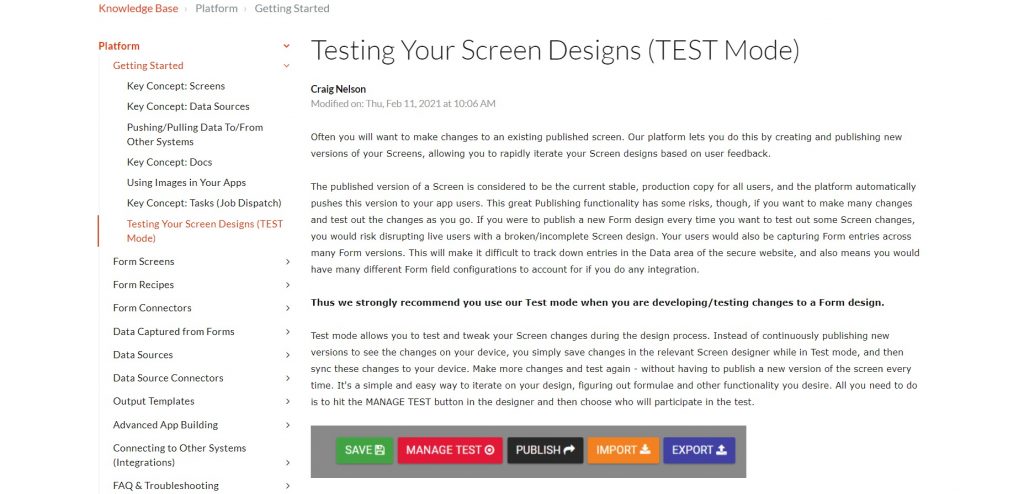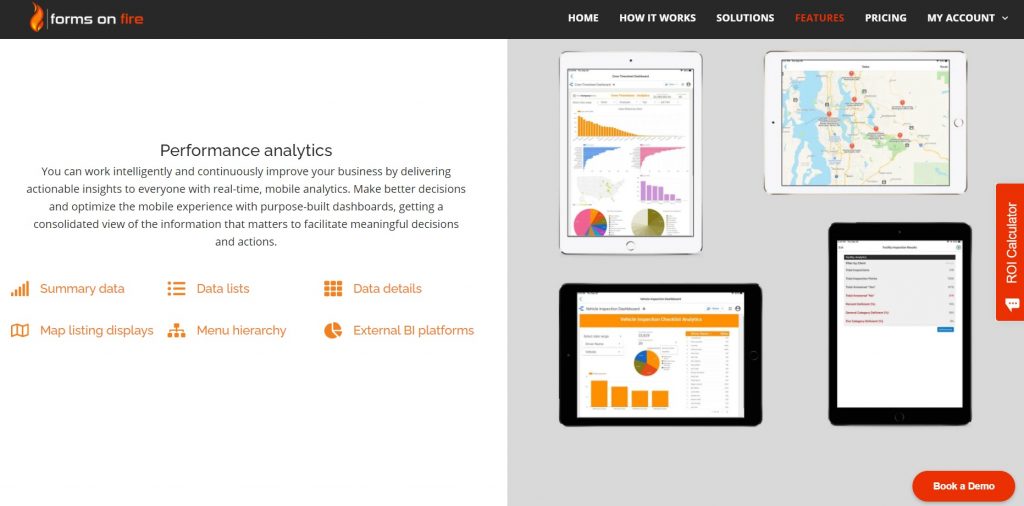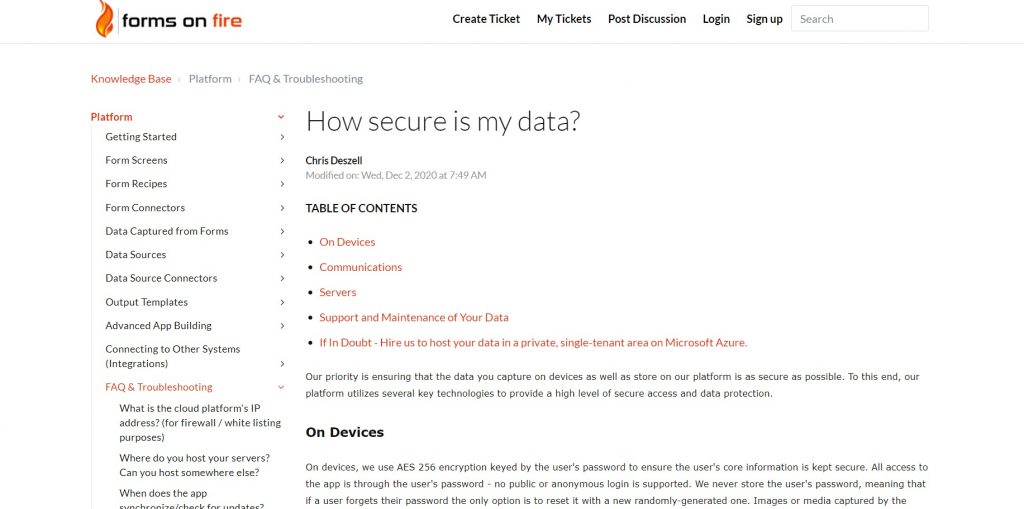Digital transformation drives more and more companies to switch to a paperless workflow that has a lot of benefits compared to the traditional ones:
- increase in the productivity of employees;
- reduction in overheads;
- improved compliance and security;
- improved customer experience, etc.
You can find a large number of web services to move your processes online. In this review, I want to pay attention only to forms automation software taking Forms On Fire as an example.
What is Forms On Fire and what is its target audience?
It’s a solution for gathering, customizing, and dispatching mobile forms between employees and customers. There can be work orders, checklists, audits, safety reports, etc.
The multifunctionality of the platform explains its popularity in different industries and all-sized businesses.
Today, I want to talk about its forms editor, analytic and security options, pricing plans and compare it with its 5 main competitors so you could choose the best tool for your business.
Description
Features
Forms editor
After registration, users are transferred to the working area with a control panel on the left side of the tab. To build a new form, you need to find an “App” tab and click on the “Screens” and “Create” buttons. After that, you should enter the basic info about the form (name, data source) and select the icon.
After that, it’s possible to customize the form using the design editor. It has the following field types:
| Field | Content |
| Page | group fields together in one screen |
| Section | read-only display of text sections, field separators, reference images |
| Text | display and capture text data |
| Numeric | display and collect number values |
| Date/Time | display and capture times, dates, or both |
| Choices | single or multiple choice selection via a drop-down, checklist |
| Location | show map and GPS locations, plus address lookup |
| Media | show audio, video, photos |
| Barcode | capture barcodes and QR codes via device camera |
| Sketch | capture signatures, finger drawings |
| Hidden | store default or calculated values, invisible to the user |
| Action | add buttons for user interaction |
It’s possible to simply drag the field on the form page and then customize it using a menu on the right side of the tab. The menu contains the following properties to modify:
- data;
- name;
- title;
- field layouts;
- color of the background;
- text lines;
- placeholder.
Using Forms On Fire, it’s possible to build and customize as many pages as you want.
After the customization, you may either publish it right away or review it in the test mode.

Before publishing, it’s important to choose an email connector. Using this tool, you can select who the emails go to or come from, customize the subject body, attachment name, etc.
Analytics
The service doesn’t have an inbuilt analytic functionality but offers a wide range of third-party services integrations. You have access to API — the data hosted on the service, using which, you can easily access or gather the data using a third-party app.
All APIs support JSON and XML formats.

Another way to set up your own reporting tool is to directly connect it to a SQL server or a BigQuery database using the Forms On Fire connectors.
Security
The service uses an advanced encryption standard with a 256-bit long key.
You can get access to the application only using the password: the service doesn’t support public or anonymous login. At the same time, Forms On Fire doesn’t store the password. So, if you forget it, you’ll need to reset it.

All media files submitted to the application are transferred to the secure area. So, they can’t be found in publicly accessible galleries, etc.
The same 256-bit encryption is used to transfer data between the mobile and the web application.
Pricing plans
The platform offers a free trial for 28 days not requiring your credit card details.
| Standart | Premium | Enterprise | |
| Cost | $20 monthly per 1 user or $240 per year | $28 monthly per 1 user or $336 per year | $36 monthly per 1 user or $432 per year |
| Storage | + | + | + |
| Applications | + | + | + |
| Multiplatform | + | + | + |
| Support | + | + | + |
| Number of entries | – | + | + |
| Premium connectors | – | + | + |
| Document management | – | + | + |
| Azure AD Seamless SSO | – | – | + |
| SYNQL for MS SQL or MySQL | – | – | + |
Main competitors
Pabbly Form Builder
Pabbly Form Builder and Forms On Fire are both form builders with a similar set of features (app creator, rule-based user authorization, etc.). Both platforms don’t have pre-built integrations, but you can embed a lot of third-party services through Zapier (Smartsheet, Google Forms, Zendesk, Membrain, etc.).
While Pabbly Form Builder is a cloud-based service, Forms On Fire offers Android and iOS applications.
The price for Pabbly Form Builder starts at $15 per form. At the same time, users get an unlimited number of features for a single form.
Pronto Forms
Both platforms support drag-and-drop options; have the same target audience and list of features. At the same time, Forms On Fire is more expensive: the cost of pricing plans starts at $20 per user, while Pronto Forms offers $15 per user per month for the “Essentials” plan.
Also, Pronto Forms users can get a free version, while Forms On Fire doesn’t provide it.
Unlike Forms On Fire, Pronto Forms has pre-built cloud integrations: Dropbox, GoogleSheets, Amazon Cloud, Sharepoint, etc.
Forms On Fire supports only the English language, while its competitor allows using service in English, Japanese, Spanish, and French languages.
FORM.com
FORM.com is a form automation software that can be used on Windows OS, Android, and iOS devices.
Unlike Forms On Fire, FORM.com offers more powerful analytic and performance features. As a user of FORM.com, you can make integrated reports and create dashboards, which are individually adapted to show the key performance indicators of your workflow. You can customize the way your data will be displayed: there can be charts, graphs, pre-configured visuals, etc.
FORM.com’s API supports SOAP standards. It means that you can connect integrations built in almost any programming language (Python, Ruby, Java, PHP, etc.).
Kissflow
Kissflow and Forms On Fire are both no coding, drag-and-drop form builders. Unlike Forms On Fire, Kissfow offers an advanced report option and real-time analytics. You can make complex filters and advanced pivots to monitor the most relevant key performance indicators. The platform supports heatmaps to transform massive datasets into easily interpretable contexts.
Both platforms support cross-system integration: you have access to the service’s API to integrate it with third-party services or can use Zapier for that purpose. The cost of Kissflow’s basic plan and Forms On Fire standard plan is the same. Also, both platforms have the same pricing model and offer free trials.
Typeform
This Forms On Fire competitor is totally web-based. Typeform doesn’t provide users with in-person or online training like Form On Fire does. At the same time, it has a comprehensive knowledge base where a user could find an answer to most questions.
When it comes to forms automation, Typeform doesn’t support document indexing and approval process control like Forms On Fire does. The platform has the same pricing model but is more expensive. The basic pricing plan costs $29 per month.
Unlike Forms On Fire, Typeform provides you with a free version.
FAQ
Does Forms On Fire support the affiliate program?
Yes, it does. The service’s partner program is managed by PartnerStack.
Can Forms On Fire work offline?
Yes, this option is available. In this case, all data is collected on the user’s device only.
Does Forms On Fire support the ROI calculator?
Yes, this option is available.
Is it possible to hire Forms On Fire experts?
No, this option is currently unavailable.
Does Forms On Fire support a money-back guarantee?
No, subscription and service fees are nonrefundable.
